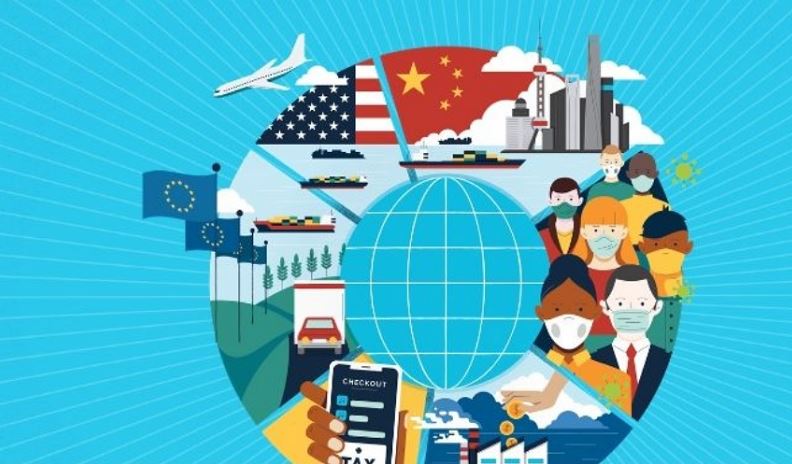The need for India to tap into trade opportunities and the way forward

Context: Slower global growth, an adverse geopolitical environment, the shadow of recurring waves of the pandemic and prolonged supply chain issues are likely to weigh on export growth this year.

This topic of “The need for India to tap into trade opportunities and the way forward” is important from the perspective of the UPSC IAS Examination, which falls under General Studies Portion.
How was the trade growth in 2021?
For world:
- The year 2021 was a record one for trade despite the pandemic. In terms of volumes, merchandise trade rose 9.8 per cent, while in dollar terms, it grew 26 per cent.
- The value of the commercial services trade was also up 15 per cent.
For India:
- India has had a good export run in line with global trends, witnessing record goods exports of $419 billion, while touching $250 billion in services exports.
What is the global trade forecast for the years 2022 and 2023?
- Global growth forecasts have now been pared down.
- According to the WTO, world merchandise trade volume is expected to grow at 3 per cent in 2022 (down from 4.7 per cent previously) and 3.4 per cent in 2023.
- World merchandise trade volume grew at twice the rate of world GDP at market exchange rates in the two decades before the global financial crisis. However, this ratio between trade and GDP growth will fall to 1.1:1 in 2022 and 2023.
Thus, slower global growth, an adverse geopolitical environment, the shadow of recurring waves of the pandemic and prolonged supply chain issues are likely to weigh on export growth this year.
What demands proactive policy actions now?
- The uncertain global economic environment calls for proactive policy actions as exporters look to tap into newer opportunities.
The vacuum created by the limited presence of Sri Lanka and Ukraine:
Wheat
- Ukraine and Sri Lanka are major exporters of agricultural products and the vacuum created by their limited presence in global trade will open up agricultural export opportunities for India.
This will not only spur overall exports but will also help to support the recovery of the agrarian economy through higher realizations.
Tea
- Sri Lanka is also a major player in the global tea market and produces around 300 million kg annually. Almost 98 per cent of its annual production is exported.
India, the second-largest producer of tea with an annual production of 900 million kg, is in a good position to exploit the opportunity and fill the gap.
Textiles
- Apart from tea and wheat, newer export opportunities have arisen for textiles.
- Sri Lanka exports $5.42 billion worth of garments and prolonged power cuts in the island nation will hurt its production and export capacity.
Major global brands such as Zara and H&M have been reportedly looking towards India since other Asian exporters like Bangladesh, Vietnam and Cambodia lack the capacity to fill the void and Chinese factories are locked up due to a Covid surge.
Africa’s food security:
- Apart from Europe, Africa’s food security depends on wheat supplies from the two countries (Russia and Ukraine) which are at war currently.
Need of the hour
If India were to tap export opportunities in developed markets, it must act proactively now.
Work on non-tariff barriers:
- There is an urgent need for India to work on non-tariff barriers for agricultural trade with a special focus on harmonizing the sanitary and phytosanitary (SPS) requirements.
- SPS barriers can be addressed in various ways including through scientific collaborations for the implementation of sector-specific measures and strengthening the traceability system in supply chains.
Greater role and autonomy for traditional tea boards:
- Traditional tea boards are seeking a greater role and autonomy for optimizing the development, promotion, and research in the sector to support tea exports,
- Quicker implementation of the proposed Tea Promotion and Development Act is of utmost importance.
Integration with global supply chains:
- India must double down on its integration with global supply chains.
- The commerce ministry has negotiated a slew of trade deals. This holds the promise of a new pro-trade policy, but India must become a part of the bigger trade pacts and regions.
Reduce tariff rates for intermediate inputs:
- Tariff rates for intermediate inputs should be reduced to either zero or should be negligible for India to become an attractive location for assembly activities.
Creation of an enabling ecosystem that realigns the specialization patterns:
- India must persist with the creation of an enabling ecosystem that realigns its specialization patterns towards labour-intensive processes and product lines.
- The labour market reforms must be taken to their logical conclusion.
A continuous and pro-active FDI policy:
- A continuous and pro-active FDI policy is also critical as foreign capital and technology are key enablers for entry into global production networks even as local firms play a role as subcontractors and suppliers of intermediate inputs to MNEs.
Ease the availability of power and sort out the logistical bottlenecks:
- Exports could suffer if basic issues such as availability of power and logistical bottlenecks keep rearing their ugly heads. So, India must act proactively on these and solve them at the earliest.
Recommendation of Economic Survey 2019:
- The Economic Survey 2019 had recommended that low levels of service link costs (costs related to transportation, communication, and other tasks involved in coordinating the activity etc.) are prerequisites to strengthen their participation in Global Value Chains (GVCs). This should not be neglected.
Practice Question for Mains
- The uncertain global economic environment calls for proactive policy actions from India to boost exports. Discuss. (250 Words, 15 Marks).

